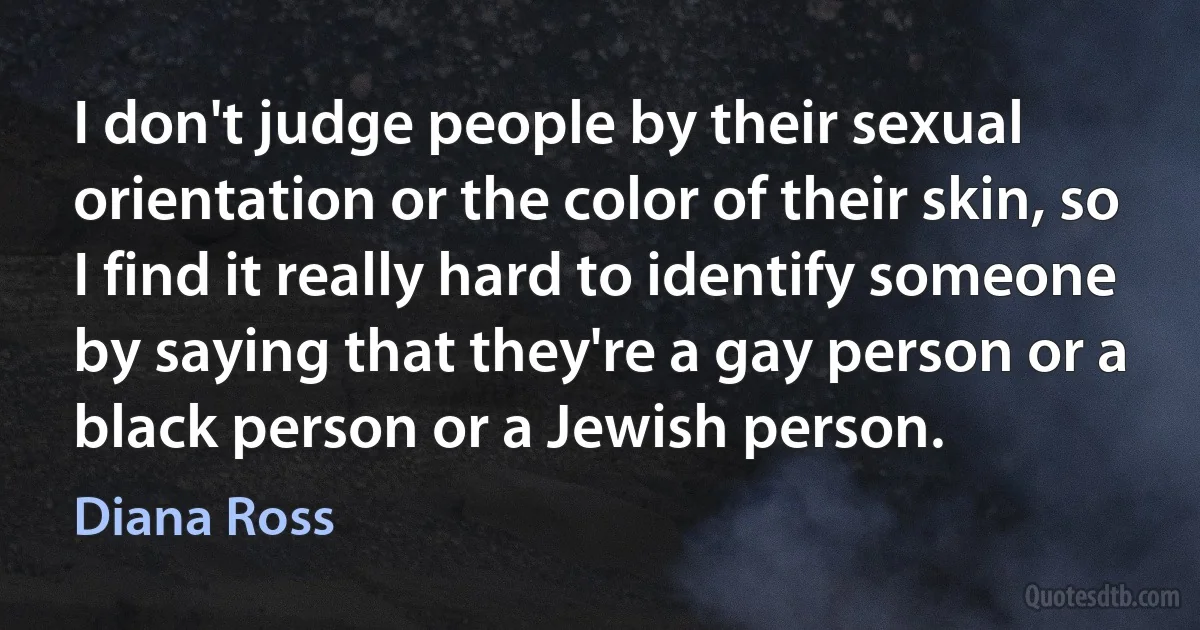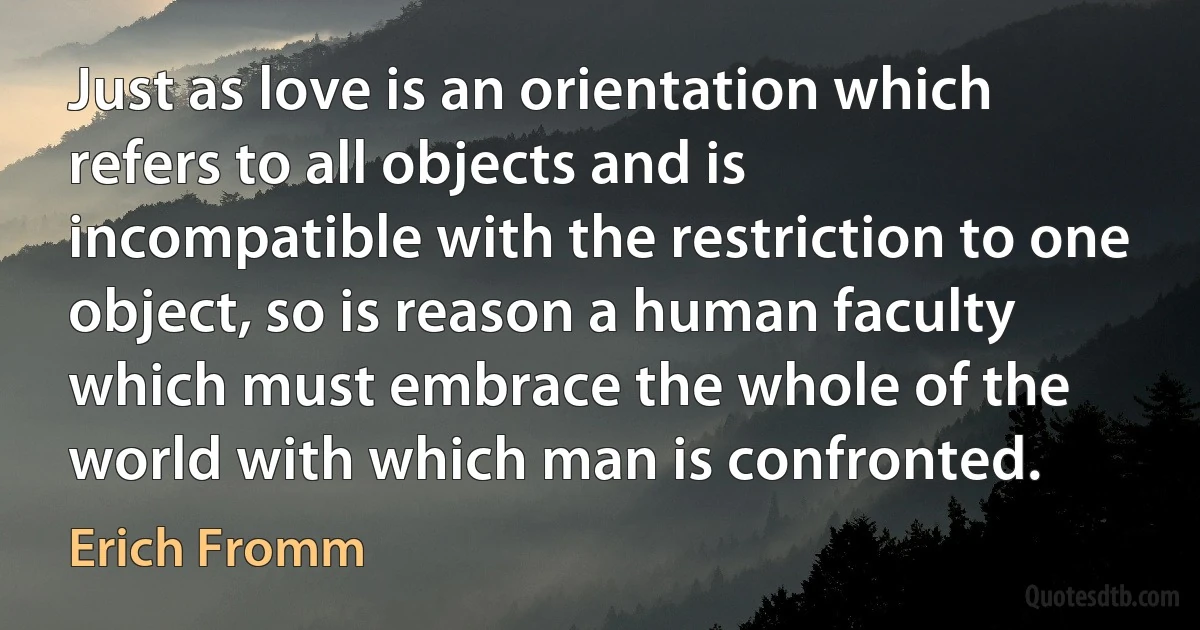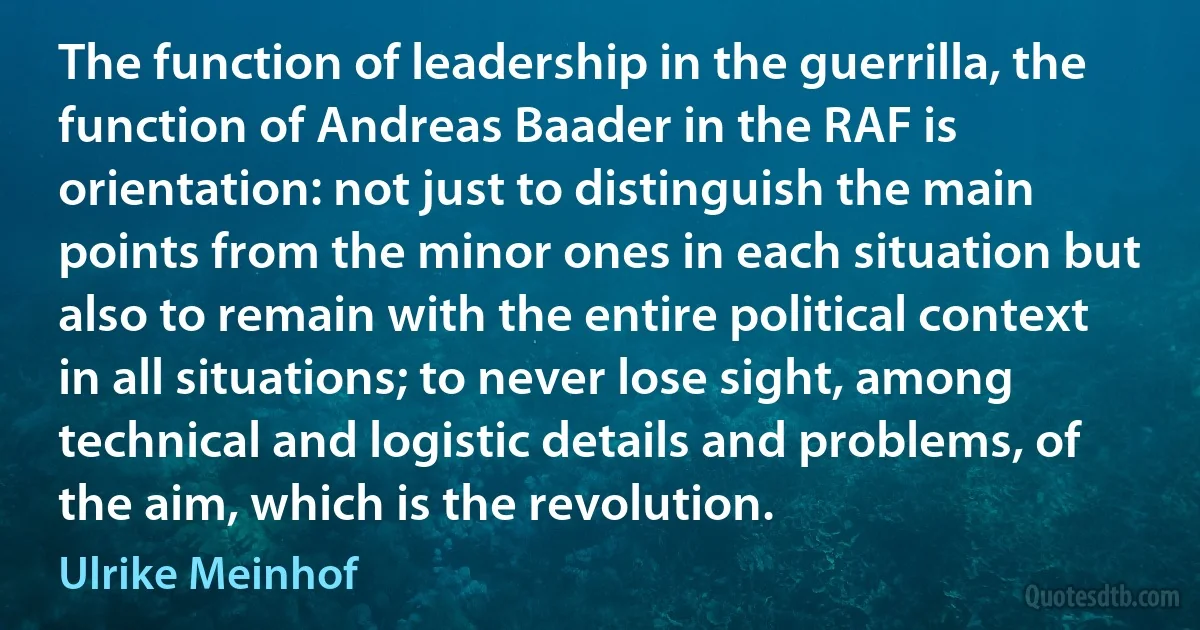Orientation Quotes - page 3
The worldly man lives in society, marries, establishes a family; Yoga prescribes absolute solitude and chastity. The worldly man is "possessed” by his own life; the yogin refuses to "let himself live”; to continual movement, he opposes his static posture, the immobility of āsana; to agitated, unrhythmical, changing respiration, he opposes prānāyāma, and even dreams of holding his breath indefinitely; to the chaotic flux of psychomental life, he replies by "fixing thought on a single point,” the first step to that final withdrawal from the phenomenal world which he will obtain through pratyāhāra. All of the yogic techniques invite to one and the same gesture-to do exactly the opposite of what human nature forces one to do. From solitude and chastity to samyama, there is no solution of continuity. The orientation always remains the same-to react against the "normal,” "secular,” and finally "human” inclination.

Mircea Eliade
Isn't it sad, that in a time when we face so many devastating problems - poverty, HIV/AIDS, war and conflict - that in our Communion we should be investing so much time and energy on disagreement about sexual orientation? [The Communion, which] used to be known for embodying the attribute of comprehensiveness, of inclusiveness, where we were meant to accommodate all and diverse views, saying we may differ in our theology but we belong together as sisters and brothers [now seems] hell-bent on excommunicating one another. God must look on and God must weep.

Desmond Tutu
Just as we reject racism, sexism, ageism, and heterosexism, we reject speciesism. The species of a sentient being is no more reason to deny the protection of this basic right than race, sex, age, or sexual orientation is a reason to deny membership in the human moral community to other humans.

Gary L. Francione
Many men, labelled homosexual by themselves and others, want to be fathers. Their beliefs and those of your society leads them to imagine that they must always be heterosexual or homosexual. Many feel a desire toward women that is also inhibited. Your male or female orientation limits you in ways that you do not understand. For example, in many cases the gentle "homosexual" father has a better innate idea of manliness than a heterosexual male who believes that men must be cruel, insensitive, and competitive.

Robert Butts
The overly specific sexual orientation, then, reflects a basic division in consciousness. It not only separates a man from his own intuitions and emotions to some extent, or a woman from her own intellect, but it effectively provides a civilization in which mind and heart, fact and revelation, appear completely divorced. To some degree each person is at war with the psyche, for all of an individual's human characteristics must be denied unless they fit in with those considered normal to the sexual identity.

Robert Butts
It is the historical mind, rather than the scientific (in the physicist's sense), that destroyed the mythical orientation of European culture; the historian, not the mathematician, introduced the "higher criticism," the standard of actual fact. It is he who is the real apostle of the realistic age. Science builds its structure of hypothetical "elements" and laws of their behavior, touching on reality at crucial points.... But the historian does not locate known facts in a hypothetical, general pattern of processes; his aim is to link fact to fact, one unique knowable event to another individual one that begot it.

Susanne Langer
I believe that freedom is not a constant attribute that "we have" or "we don't have"; perhaps there is only one reality: the act of liberating ourselves in the process of using choices. Every step in life that heightens the maturity of man heightens his ability to choose the freeing alternative.
I believe that "freedom of choice" is not always equal for all men at every moment. The man with an exclusively necrophilic orientation; who is narcissistic; or who is symbiotic-incestuous, can only make a regressive choice. The free man, freed from irrational ties, can no longer make a regressive choice.

Erich Fromm
I believe that love is the main key to open the doors to the "growth" of man. Love and union with someone or something outside of oneself, union that allows one to put oneself into relationship with others, to feel one with others, without limiting the sense of integrity and independence. Love is a productive orientation for which it is essential that there be present at the same time: concern, responsibility, and respect for and knowledge of the object of the union.

Erich Fromm
And as for the close connection between philosophy and poetry, we can refer to a little-known statement by Thomas Aquinas in his Commentary on Aristotle's Metaphysics [I, 3]: the Philosopher is akin to the Poet in this, that both are concerned with the mirandum, the "wondrous," the astonishing, or whatever calls for astonishment or wonder. This statement is not that easy to fathom, since Thomas, like Aristotle, was a very sober thinker, completely opposed to any Romantic confusion of properly distinct realms. But on the basis of their common orientation towards the "wonderful" (the mirandum - something not to be found in the world of work!) - on this basis, then, of this common transcending-power, the philosophical act is related to the "wonderful," is in fact more closely related to it than to the exact, special sciences; to this point we shall return.

Josef Pieper
The experimental psychologist... needs historical sophistication within his own sphere of expertness. Without such knowledge he sees the present in distorted perspective, he mistakes old facts and old views for new, and he remains unable to evaluate the significance of new movements and methods. In this matter I can hardly state my faith too strongly. A psychological sophistication that contains no component of historical orientation seems to me to be no sophistication at all.

Edwin Boring
America is the world's oldest constitutional democracy; that means we're going to stand up for democracy -- it's a part of who we are. And we do this not only because we think it's right, but because it's been proven to be the most stable and successful form of government. In recent decades, many Asian nations have shown that different nations can realize the promise of self-government in their own way; they have their own path. But we must recognize that democracies don't stop just with elections; they also depend on strong institutions and a vibrant civil society, and open political space, and tolerance of people who are different than you. We have to create an environment where the rights of every citizen, regardless of race or gender, or religion or sexual orientation are not only protected, but respected.

Barack Obama
I'd suggest that peace with justice begins with the example we set here at home, for we know from our own histories that intolerance breeds injustice. Whether it's based on race, or religion, gender or sexual orientation, we are stronger when all our people - no matter who they are or what they look like - are granted opportunity, and when our wives and our daughters have the same opportunities as our husbands and our sons.

Barack Obama
We know that our economies attract more trade and investment when citizens are free to start a new business without paying a bribe. We know that our societies are more likely to succeed when all our people -- regardless of color, or class, or creed, or sexual orientation, or gender -- are free to live and pray and love as they choose. [...] And, increasingly, civil society is a source of ideas -- about everything from promoting transparency and free expression, to reversing inequality and rescuing our environment.

Barack Obama
In 1980s the African National Congress was still setting the pace, being the first major political formation in South Africa to commit itself firmly to a Bill of Rights, which we published in November 1990. These milestones give concrete expression to what South Africa can become. They speak of a constitutional, democratic, political order in which, regardless of colour, gender, religion, political opinion or sexual orientation, the law will provide for the equal protection of all citizens.
They project a democracy in which the government, whomever that government may be, will be bound by a higher set of rules, embodied in a constitution, and will not be able govern the country as it pleases.

Nelson Mandela
Not only in the realm of the ethical world, and of economy, but also in that of natural phenomena, the realistic orientation of theoretical research can lead only to "real types" and "empirical laws." And in the above point of view, at any rate, no essential difference between the ethical and the natural sciences exists, but at most only one of degree. The realistic orientation of theoretical research excludes in principle, rather, in all realms of the world of phenomena the possibility of arriving at strict (exact) theoretical knowledge.

Carl Menger
Programming languages on the whole are very much more complicated than they used to be: object orientation, inheritance, and other features are still not really being thought through from the point of view of a coherent and scientifically well-based discipline or a theory of correctness. My original postulate, which I have been pursuing as a scientist all my life, is that one uses the criteria of correctness as a means of converging on a decent programming language design-one which doesn't set traps for its users, and ones in which the different components of the program correspond clearly to different components of its specification, so you can reason compositionally about it. [...] The tools, including the compiler, have to be based on some theory of what it means to write a correct program.

C. A. R. Hoare



